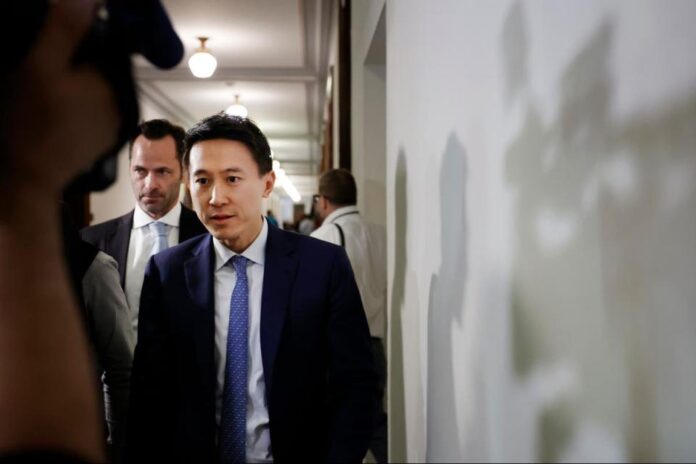TikTok’s Countdown Begins: Will the Clock Run Out for the Beloved App? In a shocking turn of events, the fate of TikTok, the social media phenomenon that has captured the hearts of millions, hangs precariously in the balance. The Supreme Court has issued an ultimatum: unless a solution is found, the popular app will cease to exist in just a matter of days. As the clock ticks down to Sunday, users around the world are left wondering if they’ll soon be forced to bid farewell to the endless stream of entertaining videos, dance challenges, and creative expression that have become an integral part of their daily lives. With the very existence of TikTok on the line, the question on everyone’s mind is: can a last-minute reprieve be found, or will the curtain close on this social media giant for good?
TikTok Ban: A Critical Turning Point for Online Freedom
The U.S. Supreme Court’s verdict on TikTok’s fate has sent shockwaves across the online community, sparking concerns about the implications of the ruling on free speech and online platforms.
The U.S. Supreme Court’s Verdict
TikTok’s Fate Secured
The Supreme Court has upheld the law requiring TikTok to sell to a U.S. company or be banned by January 19, a decision that has significant implications for the platform’s 170 million users in the U.S.
White House Abandons Enforcement
The White House has announced that it will not enforce the law, leaving the fate of TikTok in the hands of President-elect Donald Trump. This decision is seen as a significant departure from previous stances on the matter.
Supreme Court Ruling
The court’s decision was based on the unique relationship between TikTok and its foreign parent, ByteDance. The ruling does not address the broader implications of the law on free speech and online platforms.
Trump’s Plan for TikTok
Vague Response
President-elect Donald Trump has promised to “save” TikTok but has not revealed a clear plan for doing so. This response has sparked concerns about the platform’s future in the U.S.
Executive Power
Trump’s decision will be made with executive power, and it is unclear how this will impact the platform’s operations and user base.
Impact on Free Speech
Some advocates for free speech have expressed concerns that Trump’s decision could embolden Congress to further restrict online speech under the guise of national security.
Analysis and Implications
First Amendment Concerns
The Supreme Court’s decision has raised concerns about the impact on free speech and online platforms. Advocates for the First Amendment have condemned the ruling as a “disheartening blow” to millions of Americans who rely on TikTok to express themselves.
National Security Concerns
The law at the center of the case is aimed at addressing national security concerns related to TikTok’s ownership by a Chinese company. However, this approach has been criticized for its potential impact on free speech and online platforms.
Practical Consequences
The ban on TikTok has significant practical consequences for its users, including the loss of access to the platform and potential disruptions to online communities and social media networks.
The Future of TikTok and Online Freedom
Uncertainty Surrounds Trump’s Decision
The future of TikTok and online freedom hangs in the balance as Trump makes a decision on the platform’s fate. This uncertainty has sparked concerns about the impact on users and online communities.
Advocacy and Activism
Advocates for free speech and online freedom are likely to continue pushing for changes to the law and advocating for the rights of online users.
The Role of the Media
The media plays a critical role in shaping public opinion and advocating for the rights of online users. Morningpicker will continue to provide in-depth coverage of this critical issue.
Conclusion
In a landmark decision, the Supreme Court has ruled that TikTok, the popular short-video app, will be banned in the United States as of this Sunday unless it can be saved through a last-minute agreement with the government. This announcement comes after a series of legal battles and national security concerns regarding the app’s Chinese parent company, ByteDance.
The article discusses the key points of the case, including the government’s allegations of TikTok’s data collection practices and potential threats to national security. Furthermore, it highlights the app’s immense popularity, with over 100 million users in the U.S. alone, and the impact this ban could have on content creators, influencers, and small businesses that rely on the platform for their livelihoods.
The implications of this decision are far-reaching and could set a precedent for how the government regulates foreign-owned apps and technology companies. The ban on TikTok raises questions about the balance between national security and individual privacy, as well as the potential consequences for freedom of expression and the digital economy.
As we move forward, it is crucial to consider the broader implications of this decision and how it may affect other apps and technology companies. Will this ruling lead to increased scrutiny of foreign-owned apps and technology, or will it stifle innovation and limit the choices available to consumers? These are important questions that need to be addressed as we navigate the complex world of technology and national security.
In conclusion, the impending TikTok ban serves as a stark reminder of the delicate balance between national security and individual privacy. As we continue to engage with technology and apps that collect and store our data, it is essential to stay informed and vigilant about the potential risks and consequences. The future of TikTok and other similar apps hangs in the balance, and the outcome of this case will have far-reaching implications for the digital landscape and the future of technology.
